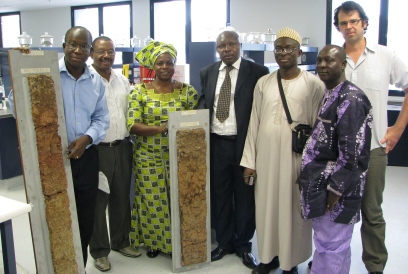Six West African soil scientists are visiting the Faculty of Agriculture, Food and Natural Resources to undertake intensive training in digital soil mapping coordinated by the University of Sydney’s Associate Professor Inakwu Odeh. The visiting fellows are sponsored by AusAID as part of the Australian Leadership Awards Fellowships program.
Associate Professor Inakwu Odeh and colleagues from the Faculty of Agriculture, Food and Natural Resources–Dr Thomas Bishop and Dr Budiman Minasny – have organised a six week program for the African visiting fellows to run in November and December 2011.
Soil mapping: Associate Professor Inakwu Odeh (second from left) and Dr Thomas Bishop (far right), from the Faculty of Agriculture, Food and Natural Resources, run soil mapping training for visiting fellows (left to right) Wilson Agyare, Mary Idowu, Martin Yemefack, Vincent Aduramigba-Modupe and Ishaku Amapu.
Coming from universities and government research and soil management agencies in Nigeria, Ghana, Cameroon and Senegal, the six visitors will further their soil science expertise using the latest soil mapping techniques.
“There is a lack of accurate soil information in many developing countries, particularly in sub-Saharan Africa,” said Associate Professor Inakwu Odeh, from the Faculty of Agriculture, Food and Natural Resources.
“This is particularly disturbing because agriculture, which should be based on careful selection of suitable soil and land resources, is the dominant economic activity in the continent,” explained Associate Professor Odeh.
“So we’re working with local African scientists to share our digital mapping expertise and software, so they can use these techniques in their home countries.”
Associate Professor Odeh will run training sessions on using geographic information system data for digital soil mapping and agricultural statistical analysis.
“We’re using open source and free statistical analysis software that our visiting fellows can access and use when they return to their home countries,” said Associate Professor Odeh.
Soil is fundamental to important ecosystem services such as food production, biodiversity, and climate and environmental regulation. As such, there has been increased interest in accurate soil information at high spatial resolution for the purpose of management decisions regarding these services.
“According to statistics published in 2010 by the Food and Agriculture Organisation of the United Nations, agricultural production in sub-Saharan Africa has grown over the past 50 years, but more slowly than the population. That means that there has been a decline in per capita energy accessibility – so not enough food being produced per person in these countries,” explained Associate Professor Odeh.
“Additionally, it turns out this very modest growth in production has been primarily through area expansion, with yields per hectare especially stagnant over the same period,” said Associate Professor Odeh.
“The problem is there’s been ill-informed selection of production areas, rather than strategically developing areas with more productive soils. Soil mapping is key to this strategic selection of agricultural areas.”
To meet the increased soil information demand in sub-Saharan Africa, a regional project called Africa Soil Information Service was launched in 2009 under the guidance of the GlobalSoilMap.Net consortium in which the University of Sydney is a major player under the leadership of Professor Alex McBratney.
The six visiting fellows are all key participants in the Africa Soil Information Service project, with their time spent at the University of Sydney aimed at capacity building in the new techniques of digital soil mapping and assessment – techniques developed at the University of Sydney and now used internationally.
This multilateral program will enable the participants to work on this regional goal and achieve high standards in the production of the functional soil information and the subsequent management recommendations across the region.
“As part of our University’s contribution to the effort of creating digital soil information for Africa, I recently spent six months in Africa and the Netherlands, lending a helping hand to the efforts of creating digital soil maps for Nigeria,” said Associate Professor Odeh.
“This current training in November and December of the West African soil scientists will further enhance the collaboration between our University and a number of key institutions in the region.”

Leave a Reply